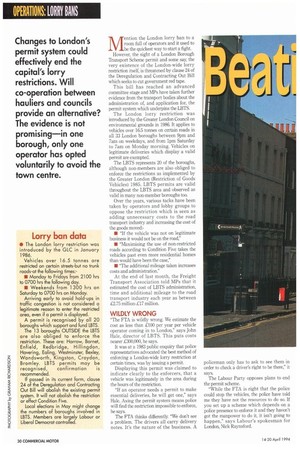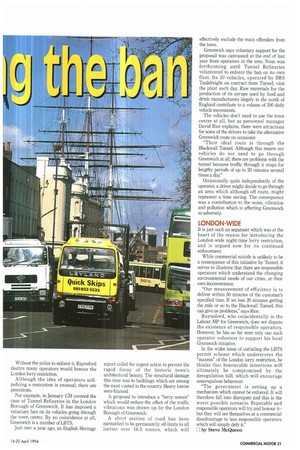ention the London lorry ban to a room full of
Page 36

Page 37

If you've noticed an error in this article please click here to report it so we can fix it.
operators and it used to be the quickest way to start a fight.
However, the sight of a London Borough Transport Scheme permit and some say, the very existence of the London-wide lorry restriction itself, is threatened by clause 24 of the Deregulation and Contracting Out Bill which seeks to cut government red tape.
This bill has reached an advanced committee stage and MPs have taken further evidence from the transport bodies about the administration of, and application for, the permit system which underpins the LBTS.
The London lorry restriction was introduced by the Greater London Council on environmental grounds in 1986. It applies to vehicles over 16.5 tonnes on certain roads in all 33 London boroughs between 9pm and 7am on weekdays, and from lpm Saturday to 7am on Monday morning. Vehicles on legitimate deliveries which display a valid permit are exempted.
The LBTS represents 20 of the boroughs, although non-members are also obliged to enforce the restrictions as implemented by the Greater London (Restriction of Goods Vehicles) 1985. LBTS permits are valid throughout the LBTS area and observed as valid in many non-member boroughs too.
Over the years, various tacks have been taken by operators and lobby groups to oppose the restriction which is seen as adding unnecessary costs to the road transport industry and increasing the cost of the goods moved: • "If the vehicle was not on legitimate business it would not be on the road," • "Maximising the use of non-restricted roads according to Condition Five takes the vehicles past even more residential homes than would have been the case," • "The additional mileage taken increases costs and administration."
At the end of last month, the Freight Transport Association told MPs that it estimated the cost of LBTS administration, time and additional mileage to the road transport industry each year as between £2.75 million-£17 million.
WILDLY WRONG
"The FTA is wildly wrong. We estimate the cost as less than £100 per year per vehicle operator coming in to London," says John Hale, director of LBTS. This puts costs nearer £300,000, he says.
It was at a 1983 public enquiry that police representatives advocated the best method of enforcing a London-wide lorry restriction at certain times, was by issuing a permit.
Displaying this permit was claimed to indicate clearly to the enforcers, that a vehicle was legitimately in the area during the hours of the restriction.
"If an operator needs a permit to make essential deliveries, he will get one," says Hale. Axing the permit system means police will find the restriction impossible to enforce, he says.
The FTA thinks differently. "We don't see a problem. The drivers all carry delivery notes. It's the nature of the business. A policeman only has to ask to see them in order to check a driver's right to be there," it says.
The Labour Party opposes plans to end the permit scheme.
"While the FTA is right that the police could stop the vehicles, the police have told me they have not the resources to do so. If you set up a scheme which depends on a police presence to enforce it and they haven't got the manpower to do it, it isn't going to happen," says Labour's spokesman for London, Nick Raynsford, Without the police to enforce it, Raynsford doubts many operators would honour the London lorry restriction.
Although the idea of operators selfpolicing a restriction is unusual, there are precedents.
For example, in January CM covered the case of Tunnel Refineries in the London Borough of Greenwich. It has imposed a voluntary ban on its vehicles going through the town centre. By no coincidence at all, Greenwich is a member of LBTS.
Just over a year ago, an English Heritage report called for urgent action to prevent the rapid decay of the historic town's architectural beauty. The structural damage this time was to buildings which are among the most visited in the country. Heavy lorries were blamed.
A proposal to introduce a "lorry screen" which would reduce the effect of the traffic vibrations was drawn up by the London Borough of Greenwich.
A short section of road has been earmarked to be permanently off-limits to all lorries over 16.5 tonnes, which will effectively exclude the main offenders from the town.
Greenwich says voluntary support for the proposal was canvassed at the end of last year from operators in the area. None was forthcoming until Tunnel Refineries volunteered to enforce the ban on its own fleet. Its 30 vehicles, operated by BRS Tankfreight on contract from Tunnel, visit the plant each day. Raw materials for the production of its syrups used by food and drink manufacturers largely in the north of England contribute to a volume of 300 daily vehicle movements.
The vehicles don't need to use the town centre at all, but as personnel manager David Rice explains, there were attractions for some of the drivers to take the alternative Greenwich route on occasions: "Their ideal route is through the Blackwall Tunnel. Although this means our vehicles do not need to go through Greenwich at all, there are problems with the tunnel because traffic through it stops for lengthy periods of up to 20 minutes several times a day."
Occasionally quite independently of the operator, a driver might decide to go through an area which although off route, might represent a time saving. The consequence was a contribution to the noise, vibration and pollution which is affecting Greenwich so adversely.
LONDON-W1DE
It is just such an argument which was at the heart of the reason for introducing the London-wide night-time lorry restriction, and is argued now for its continued enforcement.
While commercial suicide is unlikely to be a consequence of this initiative by Tunnel, it serves to illustrate that there are responsible operators which understand the changing environmental needs of our cities, at their own inconvenience.
"Our measurement of efficiency is to deliver within 30 minutes of the customer's specified time. If we lose 20 minutes getting the mile or so to the Blackwall Tunnel, this can give us problems," says Rice.
Raynsford, who coincidentally is the Labour MP for Greenwich, does not dispute the existence of responsible operators. However, he has so far seen only one such operator volunteer to support his local Greenwich initiative.
In the wider issue of curtailing the LBTS permit scheme which underscores the "success" of the London lorry restriction, he thinks that honourable intentions will ultimately be compromised by the deregulation bill, which will encourage unscrupulous behaviour.
"The government is setting up a mechanism which cannot be enforced. It will therefore fall into disrepute and this is the worst possible scenario. Reputable and responsible operators will try and honour it— but they will see themselves at a commercial disadvantage to less responsible operators which will simply defy it."
El by Steve McQueen


























































































